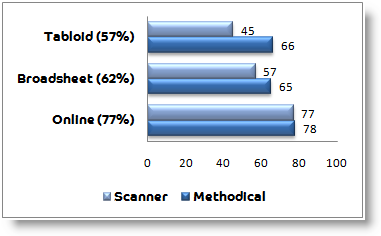One of my main focuses in web development is content. Most of this content is written or at least is starts as the written word. The most frequent comments that I hear from clients or in debates with other team members about content are:
"People don't read"
"Users only skim"
"No one has the time to read"
"Users have no attention span"
"Make it all bullet points"
"So what about the writing they just look at the pictures."
But while there is some truth to the skimming, the not reading is just plain wrong.
The thing is people are in a hurry, they do skim and scan pages but that's the exact same thing that we do when we read a newspaper. In fact, we say that we "look at" not "read" a magazine. But we most certainly do end up reading parts of both media.
In fact, what users are doing, regardless of the medium, is seeking out the information that is pertinent to them at that moment in time.
There's always more to say
In real life, I'm known for telling long stories. It's true, I admit it. But most of these stories are worth the listeners time. When it comes to writing copy, my first drafts are always way longer than I'd like. I work out the content strategy for each page before I start but I need to know that I haven't missed anything important. There's always so much to say about a given topic that I need to see it all on paper (or on the screen) before I decide what to eliminate or put elsewhere.
As you can imagine I was delighted to find this eye tracking study that revealed that even on longer articles, readers tended to complete a higher percentage of the entire article when read online versus in newsprint.

credit: Poynter Institute: Eyetracking the News: a study of print & online reading.
In fact, people read more deeply online than they do in print, and on the web, “scanners” tend to read about as much text as “methodical readers.”
Nonetheless, the study does confirm the common online writers wisdom that shorter text bites combined with visual elements work best online.
Where is the interest?
The reality is that way too much of what's written on a web site isn't of great interest to the user and even worse, so much content is poorly written, structured or presented that you'd have to be really dedicated to the topic in order to wade through it.
When it comes to B2B sites in particular, we really want to hear from the experts. Most experts however, (sorry, no offense is intended) are not writers. These experts are busy doing what they do best so finding time to get their knowledge down on paper or in a form that is easily digestible to the average reader is just not an easy task.
When they do finally get something down on paper, even if it's a topic of interest, it's going to need to be adapted to the web site. They've probably never heard about scanability, subtitles, adding images and hyperlinked text, let alone SEO concerns such as, anchor text, meta data, key phrases and such.
Add in the need to constantly feed the site with new content and you've got a recipe for well, poor content.
Doing it right
Few web developers come to be developers because they care about content. If yours doesn't, you should talk with someone who is specifically an online content developer. It will make a difference. Users will still scan, but you should find an improvement in the length of time devoted per page - meaning that the copy is being read.
In fact, a good web copy writer will probably do wonders for your navigation - and if you read the aforementioned study, you'll know just how important that is to helping users read.
Related Articles: